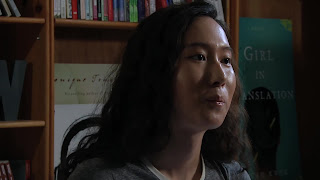Director: Patrick G Lee
Release Year: 2017
Release Year: 2017
Unspoken is a poignant and deeply personal 2017 documentary by Patrick G. Lee that captures the journeys of six queer and trans Asian Americans navigating their identities within the intricate dynamics of family, culture, and self-acceptance. Through powerful mediums like letter-writing, community discussions, and even drag performance, the film opens a window into their struggles, triumphs, and the hope for familial understanding.
The film’s participants represent a rich spectrum of the Asian diaspora, with ancestral ties to Sri Lanka, Myanmar, China, and Korea. Despite their varied backgrounds, they share a common thread: the challenge of reconciling their queerness with their cultural heritage and immigrant family values. Some of the interviewees are still in the closet, using this documentary as a preliminary step toward opening up to their families. Others have broached the topic of their queerness, only to be met with resistance, denial, or silence. For many, language barriers further complicate communication, leaving vital emotions and truths unsaid. This documentary becomes a platform where participants imagine a world in which generational, cultural, and linguistic divides are healed. They articulate their thoughts and feelings as if speaking to their families in a space free of judgment or misunderstanding.
Central to the documentary is the deeply personal act of letter-writing. Participants pen heartfelt messages to their parents and loved ones, expressing what they have long kept hidden. These letters are raw, vulnerable, and laden with years of bottled-up emotions. One individual recounts writing to their mother, explaining their decision to embrace their queerness after years of internal struggle: “Mom, I don’t want to lie to you anymore. After more than ten years, I want to fully embrace who I am. I am gay. But that does not change the fact that I am still your son.” Another shares their trans identity with their family, reflecting on the guilt and self-blame they’ve carried: “It hurt me when you asked if my transness was because you raised me alone. I didn’t want you to blame yourself, so I reflexively said, ‘No.’ But single motherhood does not feminize boys, nor does fatherhood masculinize them. This is just who I am.” The letters reveal the participants’ internal conflicts - balancing gratitude for their parents' sacrifices with the pain of feeling unseen or unaccepted. They also highlight the universal longing for love and understanding, despite differences in identity.
Beyond personal reflections, Unspoken also explores the role of community in fostering acceptance and healing. Group discussions and shared experiences provide a space for participants to find solidarity and support. These interactions demonstrate the strength of collective resilience and the importance of chosen families for those who may feel alienated from their biological ones. One particularly striking moment in the film is a drag performance, which becomes an act of defiance and self-expression. Through the art of drag, participants reclaim their narratives, challenging stereotypes and celebrating their multifaceted identities.
A recurring theme in Unspoken is the hope for familial acceptance. Some participants recount their parents’ initial dismissal of their queerness as a “phase” or a “lifestyle choice.” Others describe the fear of coming out, worrying that their truth might be seen as a betrayal of their family’s sacrifices. One individual reveals: “Whenever someone says, ‘Your parents must be proud of you,’ I think of my queerness. If they knew, I felt it would negate everything else. It felt unfair to ask for their acceptance after all they’ve done for me.” For many, this fear of rejection is intertwined with cultural expectations and the weight of being part of an immigrant family. The film tenderly examines these tensions, offering no easy answers but instead celebrating the courage it takes to confront them.
While Unspoken delves into the pain and challenges of being queer and trans within immigrant families, it is also a film rooted in hope. The participants express their dreams of a future where their identities are not just tolerated but celebrated. One individual concludes their letter with a heartfelt plea: “Over time, I hope you’ll learn more about what it means to be gay and why it is something to celebrate rather than fear. I am committed to our relationship and hope you’ll continue this journey with me.” This sentiment encapsulates the documentary’s essence: a hopeful yearning for connection and understanding, even in the face of immense difficulty.
Unspoken is more than a documentary; it is a testament to resilience, vulnerability, and the transformative power of storytelling. Patrick G. Lee masterfully captures the voices of those who have long been silenced, creating a space for them to be heard, celebrated, and understood. The film invites viewers to reflect on their own relationships, encouraging empathy and dialogue. It serves as a reminder that while acceptance may not come easily, the act of speaking one’s truth is a courageous and vital step toward healing.
via: youtube
Image credits: YouTube


.jpg)
.jpg)

.jpg)
.jpg)
No comments:
Post a Comment